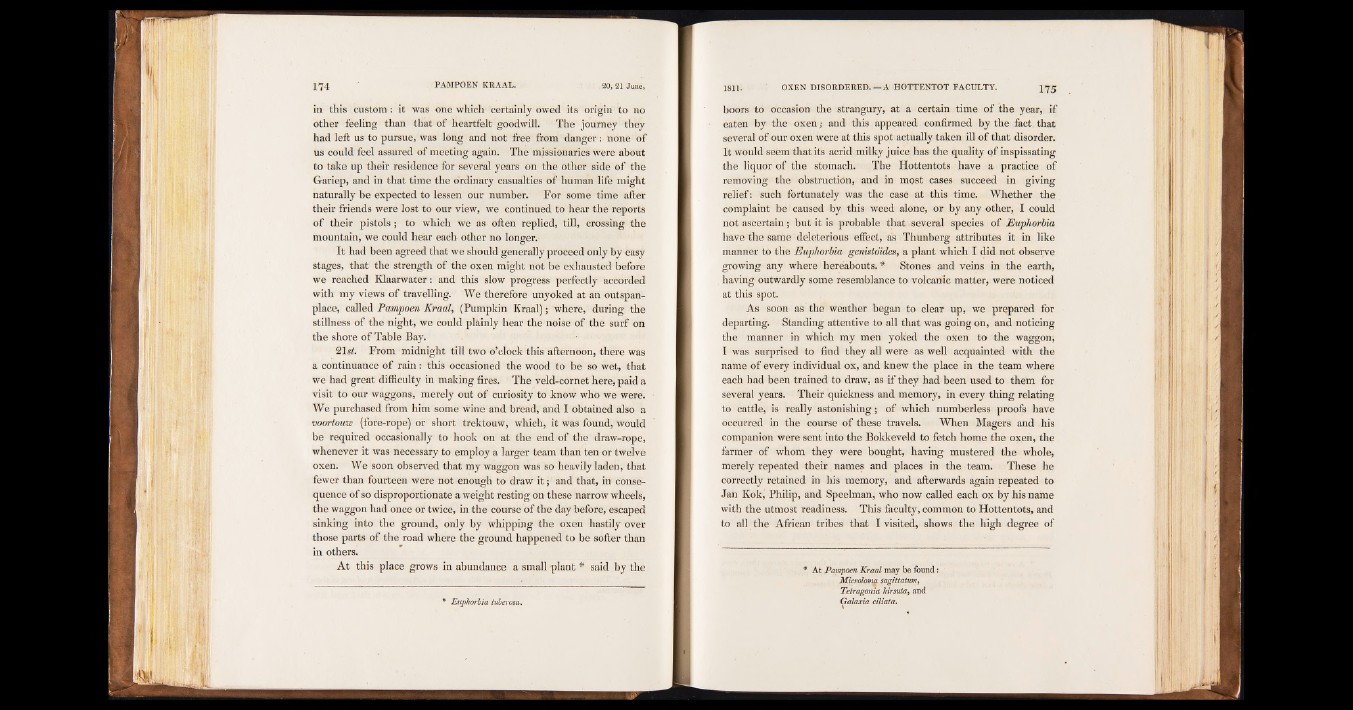
in this custom: it was one which certainly owed its origin to no
other feeling than that of heartfelt goodwill. The journey they
had left us to pursue, was long and not free from danger: none of
us could feel assured of meeting again. The missionaries were about
to take up their residence for several years on the other side of the
Gariep, and in that time the ordinary casualties of human life might
naturally be expected to lessen our number. For some time after
their friends were lost to our view, we continued to hear the reports
of their pistols; to which we as often replied, till, crossing the
mountain, we could hear each other no longer.
It had been agreed that we should generally proceed only by easy
stages, that the strength of the oxen might not be exhausted before
we reached Klaarwater: and this slow progress perfectly accorded
with my views of travelling. We therefore unyoked at an outspan-
place, called Pampoen Kraal, (Pumpkin Kraal); where, during the
stillness of the night, we could plainly hear the noise of the surf on
the shore of Table Bay.
21st. From midnight till two o’clock this afternoon, there was
a continuance of rain: this occasioned the wood to be so wet, that
we had great difficulty in making fires. The veld-cornet here, paid a
visit to our waggons, merely out of curiosity to know who we were.
We purchased from him some wine and bread, and I obtained also a
voortouw (fore-rope) or short trektouw, which, it was found, would
be required occasionally to hook on at the end of the draw-rope,
whenever it was necessary to employ a larger team than ten or twelve
oxen. We soon observed that my waggon was so heavily laden, that
fewer than fourteen were not enough to draw i t ; and that, in consequence
of so disproportionate a weight resting on these narrow wheels,
the waggon had once or twice, in the course of the day before, escaped
sinking into the ground, only by whipping the oxen hastily over
those parts of the road where the ground happened to be softer than
in others.
At this place grows in abundance a small plant * said by the
* Euphorbia tuberosa.
boors to occasion the strangury, at a certain time of the year, if
eaten by the oxen; and this appeared confirmed by the fact that
several of our oxen were at this spot actually taken ill of that disorder.
It would seem that its acrid milky juice has the quality of inspissating
the liquor of the stomach. The Hottentots have a practice of
removing the obstruction, and in most cases succeed in giving
relief: such fortunately was the case at this time. Whether the
complaint be caused by this weed alone, or by any other, I could
not ascertain; but it is probable that several species of Euphorbia
have the same deleterious effect, as Thunberg attributes it in like
manner to the Euphorbia genisto'ides, a plant which I did not observe
growing any where hereabouts.* Stones and veins in the earth,
having outwardly some resemblance to volcanic matter, were noticed
at this spot.
As soon as the weather began to clear up, we propared for
departing. Standing attentive to all that was going on, and noticing
the manner in which my men yoked the oxen to the waggon,
I was surprised to find they all were as well acquainted with the
name of every individual ox, and knew the place in the team where
each had been trained to draw, as if they had been used to them for
several years. Their quickness and memory, in every thing relating
to cattle, is really astonishing; of which numberless proofs have
occurred in the course of these travels. When Magers and his
companion were sent into the Bokkeveld to fetch home the oxen, the
farmer of whom they were bought, having mustered the whole,
merely repeated their names and places in the team. These he
correctly retained in his memory, and afterwards again repeated to
Jan Kok, Philip, and Speelman, who now called each ox by his name
with the utmost readiness. This faculty, common to Hottentots, and
to all the African tribes that I visited, shows the high degree of
* At Pampoen Kraal may be found:
Microlomg. s'agittatum,
Tetragonia hirsuta, and
GI alaxia ciliata.